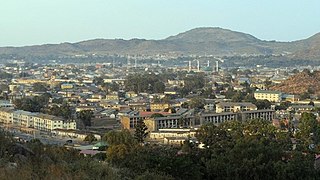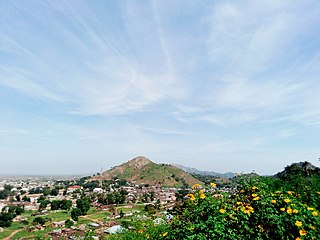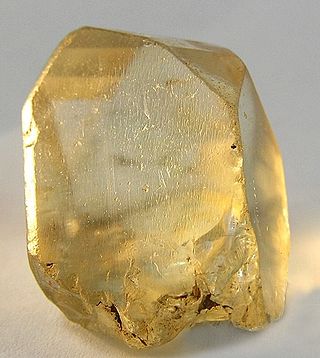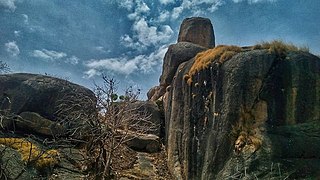Related Research Articles

Preikestolen or Prekestolen is a tourist attraction in the municipality of Strand in Rogaland county, Norway. Preikestolen is a steep cliff which rises 604 metres (1,982 ft) above Lysefjorden. Atop the cliff, there is an almost flat top of approximately 25 by 25 metres. Preikestolen is located near the Western part of the fjord, and on its North side.

Enugu is the capital city of Enugu State in Nigeria. It is located inland in the Southeastern part of Nigeria. According to the 2006 census, the city had a population of 820,000.

Salgótarján is a city with county rights in Hungary, the capital of Nógrád county, north-eastern Hungary, making it the third smallest county capital based on population. Nearby Salgó Castle is a well-known tourist attraction.

Jos is a city in the North-Central region of Nigeria. The city has a population of about 900,000 residents based on the 2006 census. Popularly called "J-Town", it is the administrative capital and largest city of Plateau State. The city is situated on the Jos plateau which is embedded in the Guinea Savannah of North-Central Nigeria. It connects most of the North-Eastern capitals to the Federal Capital Territory Abuja, by road. Driving in and out of Jos, traffic encounters very steep sloppy bends and breathtaking mountainous sceneries typical of the plateau landform. The name of the state was coined from its affiliation to this landform.

Benue State is one of the North Central states in Nigeria with a population of about 4,253,641 in the 2006 census. The state was created in 1976 and was among the seven states created at that time. The state derives its name from the Benue River which is the second largest river in Nigeria after the River Niger. The state borders Nasarawa State to the North; Taraba State to the East; Kogi State to the West; Enugu State to the South-West; Ebonyi and Cross-Rivers State to the South; and has an international border with Cameroon to the South-East. It is inhabited predominantly by the Tiv, Idoma, and Igede people. Minority ethnic groups in Benue are Etulo, Igbo, and Jukun people, etc. Its capital is Makurdi. Benue is a rich agricultural region; common crops cultivated in the statte include oranges, yams, mangoes, sweet potatoes, cassava, soya bean, guinea corn, flax,, sesame, rice, groundnuts, and palm trees.

Plateau State is a north central Nigerian state. It is located near the centre of Nigeria and includes a range of hills surrounding the Jos Plateau. Plateau State is described as "The Home of Peace and Tourism". The state has a population of around 4.7 million people. Its capital city is Jos.

Enugu State is a state in the South-East geopolitical zone of Nigeria, bordered to the north by the states of Benue and Kogi, Ebonyi State to the east and southeast, Abia State to the south, and Anambra State to the west. The state takes its name from its capital and largest city, Enugu. The city acquired township status in 1917 and was called Enugwu-Ngwo. Due to the rapid expansion towards areas owned by other indigenous communities, it was renamed Enugu in 1928.

Chimaroke Nnamani is a medical doctor and Nigerian politician from Enugu State. He was elected Governor of Enugu State in the 1999 Enugu State gubernatorial election from 1999 to 2007. He subsequently served as a People's Democratic Party (PDP) Senator for Enugu East Senatorial District from 2007 to 2011 and was re-elected in 2019.

Shooting Stars Sports Club is a Nigerian professional football club based in Ibadan, in south-western Nigeria.
Ngwo is a town located in the south-eastern state of Enugu, Nigeria, with a population of about 100,000 people. The town's native population are of Igbo ethnicity. Ngwo is among the major landlord to the administrative, political and economic hub of Enugu City, in that public and private institutions, shopping malls, hotels, banks and so on are situated in some Ngwo lands.
The Nigerian Coal Corporation (NCC) is a Nigerian parastatal corporation responsible for mining and selling coal. It is based in Enugu.

The mining of minerals in Nigeria accounts for only 0.3% of its gross domestic product, due to the influence of its vast oil resources. The domestic mining industry is underdeveloped, leading to Nigeria having to import minerals that it could produce domestically, such as salt or iron ore. The rights to ownership of mineral resources is held by the Federal Government of Nigeria, which grants titles to organizations to explore, mine, and sell mineral resources. Organized mining began in 1903, when the Mineral Survey of the Northern Protectorates was created by the British colonial government. A year later, the Mineral Survey of the Southern Protectorates was founded. By the 1940s, Nigeria was a major producer of tin, columbite, and coal. The discovery of oil in 1956 hurt the mineral extraction industries, as government and industry both began to focus on this new resource. The Nigerian Civil War in the late 1960s led many expatriate mining experts to leave the country. Mining regulation is handled by the Ministry of Solid Minerals Development, who are tasked with the responsibility of overseeing the management of all mineral resources in Nigeria. Mining law is codified in the Federal Minerals and Mining Act of 1999. Historically, Nigeria's mining industry was monopolized by state-owned public corporations. This led to a decline in productivity in almost all mineral industries. The Obasanjo administration began a process of selling off government-owned corporations to private investors in 1999. The Nigerian Mining Industry has picked up since the "Economic Diversification Agenda", from Oil & Gas, to Agriculture, Mining, etc., began in the country.
Awgu is the Headquarters of Awgu Local Government Area (LGA) in Enugu State, Nigeria and the Headquarters of Awgu Catholic Diocese. The Catholic Cathedral is said to resemble a space ship when viewed with Google Earth. The town is also the Orientation Training Centre for National Youth Service corps members posted to Enugu State. Geographically, Awgu LGA is located approximately between latitudes 06 00’ and 06 19’ North of the Equator and longitudes 07 23’ and 07 35’ East of the Greenwich Meridian. Awgu LGA is bounded in the north by Udi and Nkanu West LGAs, in the west by Oji River LGA, Aninri LGA and Ivo LGA of Ebonyi State in the East and share border with umunneochi L.G.A of Abia State in the south. The name of the Traditional ruler is Egbeleli. The market is known as Orie Awgu.

Oji River is a Local Government Area of Enugu State, Nigeria. It borders Anambra State and Abia State. Its headquarters are in the town of Oji River. The towns within Oji River L G A are:- Inyi, Achi Agụ, Achị Ụlọ, Awlaw, Akpugoeze, Oji-River Urban and Ugwuoba.
Iva Valley is a locality located in the Nigerian. Ngwo township in Enugu city

The Shere Hills are a range of undulating hills and rock formations on the Jos Plateau, situated about 10 km east of the Jos metropolis, the capital of Plateau State in the Middle Belt region of Nigeria.
Anambra Basin is one of the energy-rich inland sedimentary basins in Nigeria. It is a nearly triangular shaped embayment covering about 3000 km2 with a total sedimentary thickness of approximately 9 km. The Basin lying between 6°–7.8°N latitude and 6°40'–7°30'E longitude, is an area of agricultural and fisheries production. Fish species of genus Clarias are common in the basin especially in the dry season.

The geology of Nigeria formed beginning in the Archean and Proterozoic eons of the Precambrian. The country forms the Nigerian Province and more than half of its surface is igneous and metamorphic crystalline basement rock from the Precambrian. Between 2.9 billion and 500 million years ago, Nigeria was affected by three major orogeny mountain-building events and related igneous intrusions. Following the Pan-African orogeny, in the Cambrian at the time that multi-cellular life proliferated, Nigeria began to experience regional sedimentation and witnessed new igneous intrusions. By the Cretaceous period of the late Mesozoic, massive sedimentation was underway in different basins, due to a large marine transgression. By the Eocene, in the Cenozoic, the region returned to terrestrial conditions.
Enugu West senatorial district in Enugu State covers five local governments of Aniniri, Awgu, Ezeagu, Oji River and Udi. Agwu is the collation centre for Enugu West senatorial district. Senator Osita Ngwu, an engineer and an accomplished industrialist is currently representing the people of Enugu West in the 10th Senate of the Federal Republic of Nigeria.
The 1949 Enugu Colliery Massacre, also known as The Iva Valley Shooting, took place on 18 November 1949, when a British Superintendent of Police, F.S. Philip, commanding a number of British and Nigerian Police Officers ordered the shooting of unarmed protesting coal mine workers of the Iva Valley Coal Mine who were on strike.
References
- ↑ "Enugu: Top 10 Tourist Attractions Every Nigerian Should Visit In The Coal City - Nigerian Bulletin - Naija Trending News". nigerianbulletin.com. Retrieved 2019-06-03.
- ↑ "EMC3 | Udi Hills". emc3nigeria.com. Retrieved 2019-06-03.
- ↑ "Udi-Nsukka Plateau | plateau, Nigeria". Britannica.com. Retrieved 2019-06-03.
- ↑ "content/ugwueme-and-udi-hills#". zodml.org. Retrieved 2019-06-03.
- ↑ "Udi Hills". Afro Tourism. Retrieved 2019-06-03.
- ↑ Funmilayo-odede (2022-05-13). "Udi hills: The rock climbing haven in Enugu State". Pulse Nigeria. Retrieved 2024-07-27.